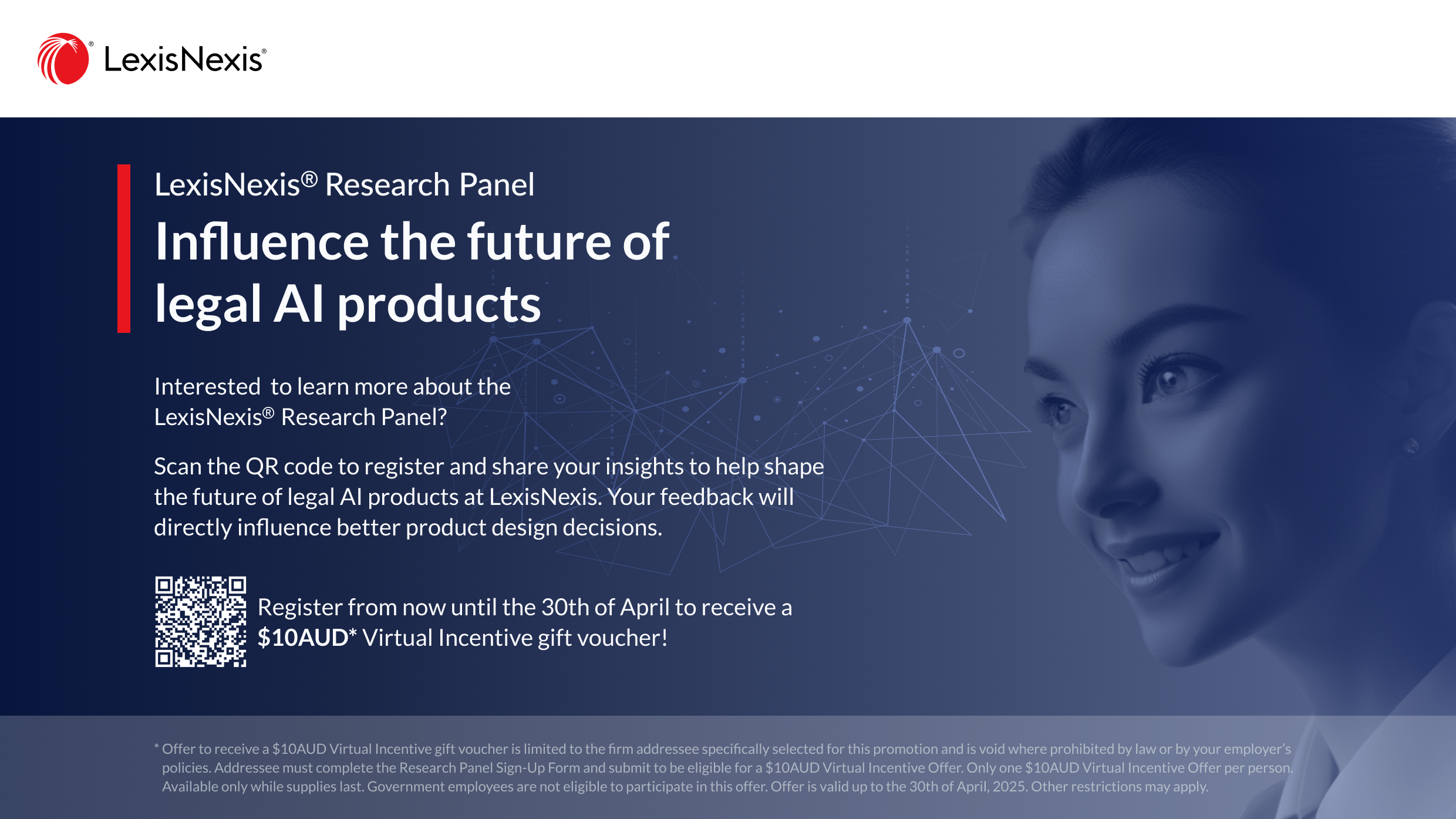


- Upload Task Enhancements: We introduced into the Upload task the ability to compare and contrast uploaded documents. We also made it possible for users to find specific arguments and entities from within the documents as well as summarise issues and facts from them. Finally, we also added the chronology feature where you can generate a timeline based on single or multiple documents.
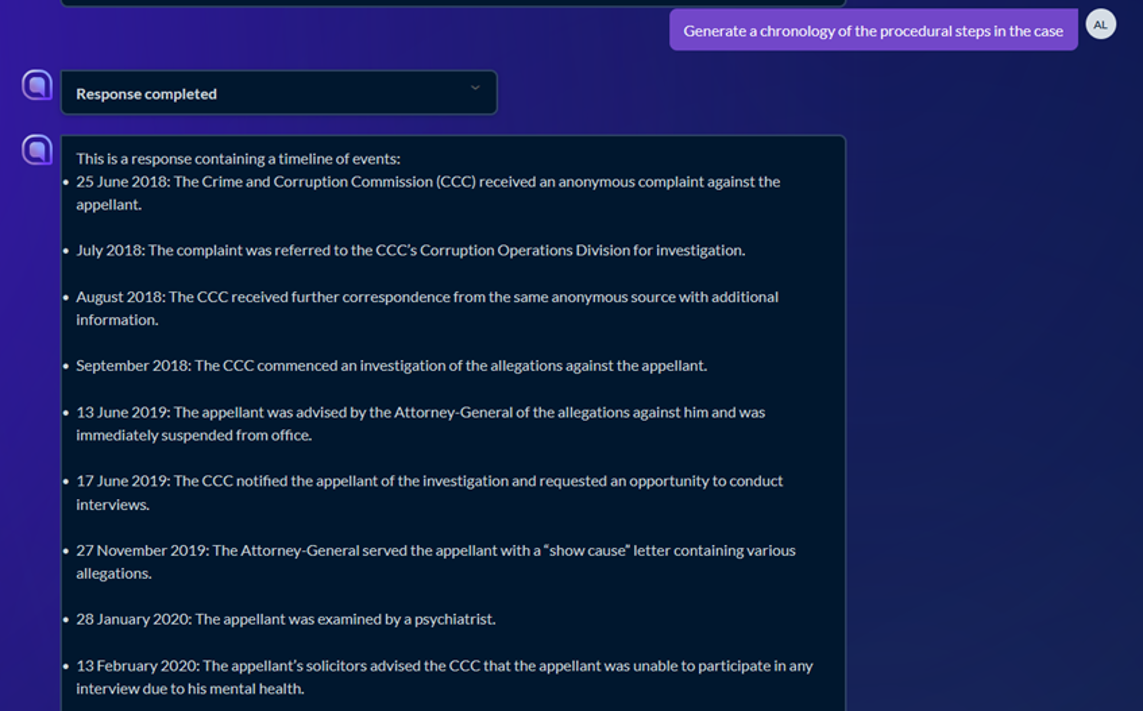
- Ask Task Improvements: Specify absolute or relative date ranges for more precise case research using our AI Assistant.
- Summarise Task Updates: It is now easier to summarise cases using common case names. When you ask the AI Assistant to summarise a case based only on a case name with multiple possible matches, it will now summarise the reported version of the first result. In this situation, you will now see a message from the AI Assistant letting you know that it found multiple cases matching your prompt, along with the full citation of the case chosen for summarisation. Further, you can now ask further questions about a case after using the Summarise task.
- Enhanced User Interface: Redesigned for better readability and easier navigation of chat history based on customer feedback.
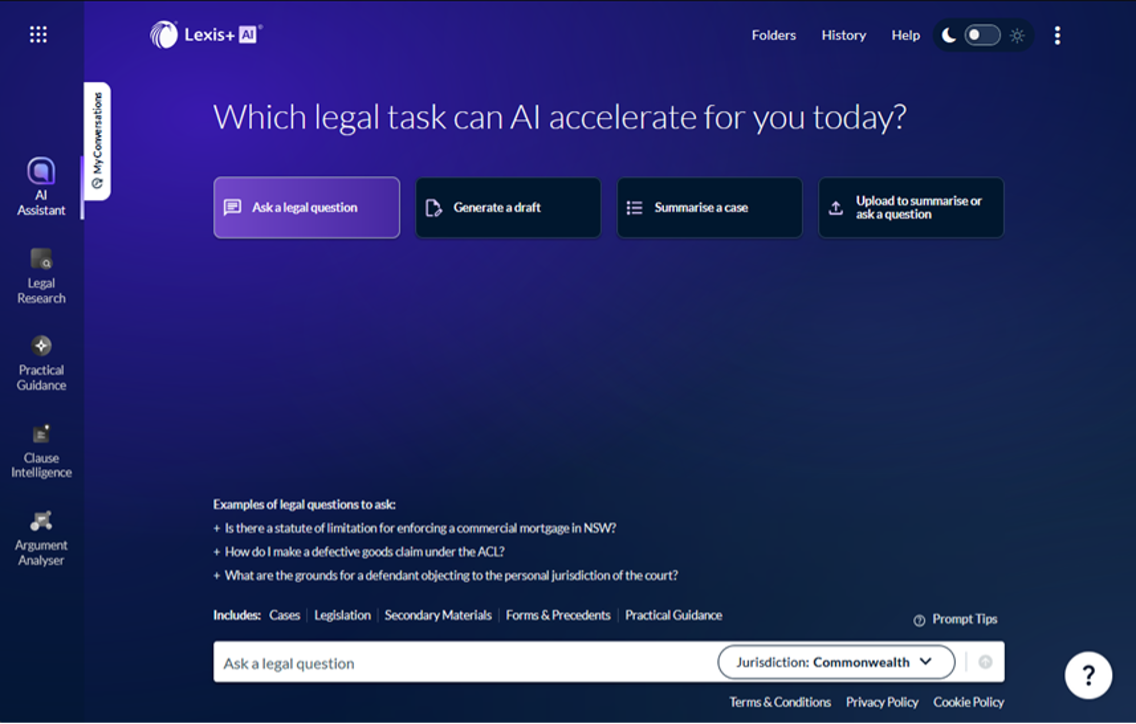
- AI Conversations in History: Access and re-run past conversations directly from the History section.

- Improved Source Display: Legislation titles and case citations now appear with greater context, including CaseBase® signals.
- Multi-Turn Recommendations: Receive tailored suggestions for document drafting within tasks.
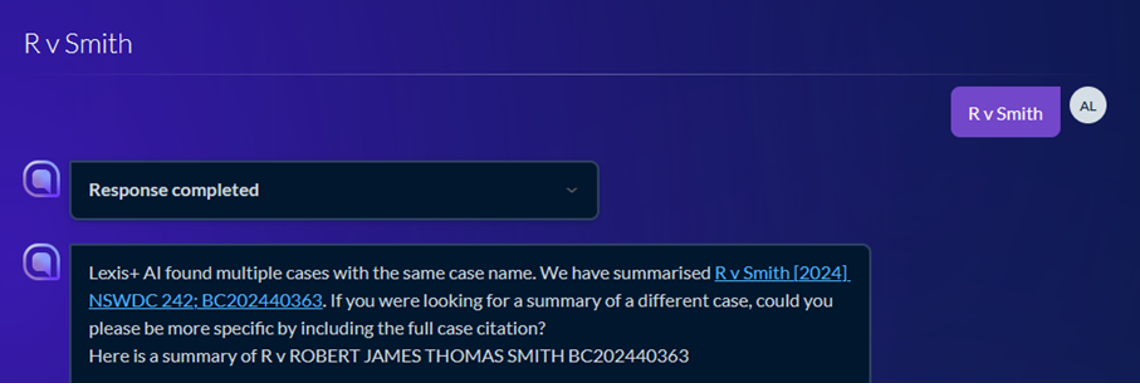
- Stop Responding Button: Cancel AI responses mid-generation to quickly refine your prompt or clarify your request.
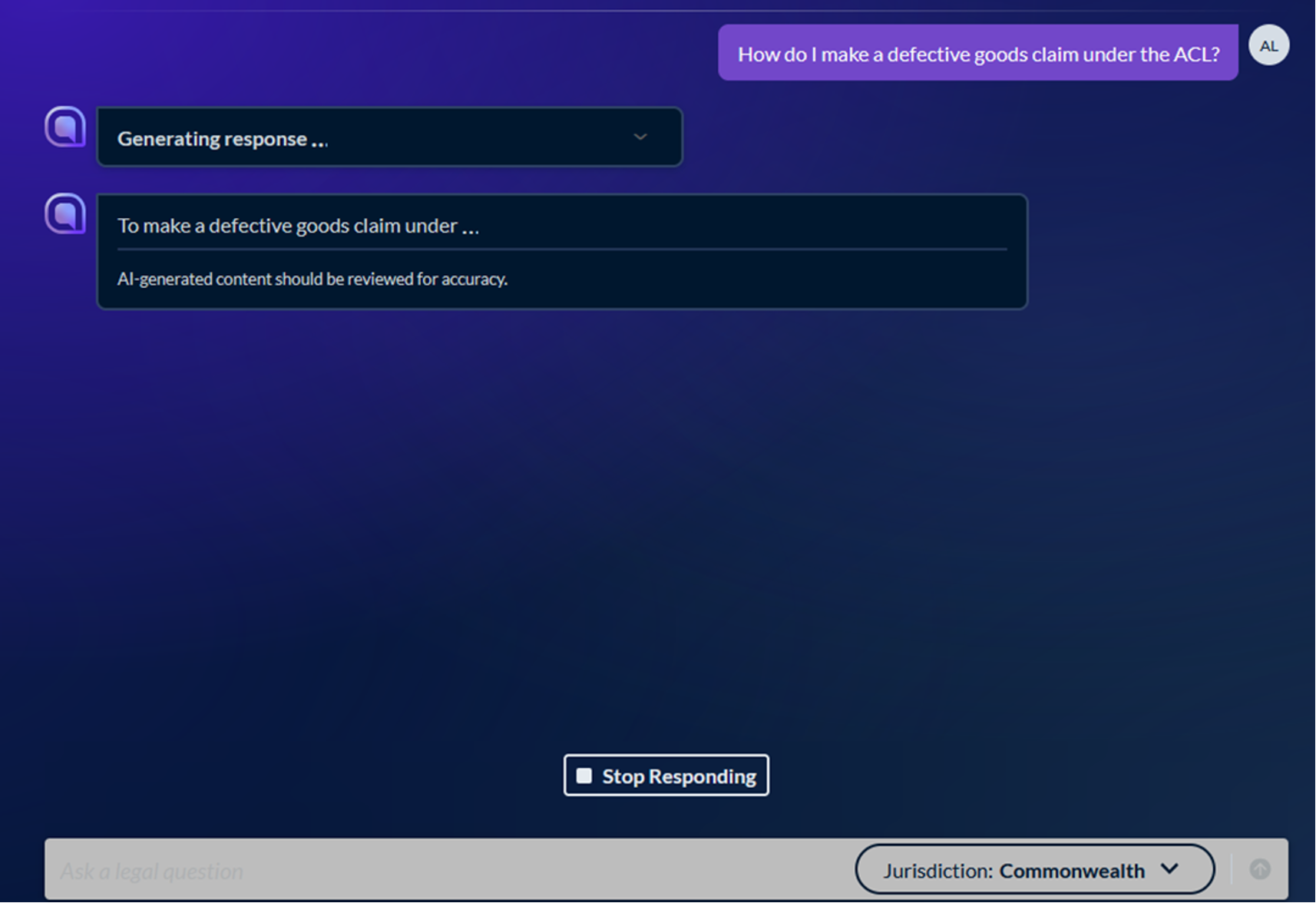
- Bulk Document Delivery: From within the View More Materials tab, it is now possible to deliver all documents for further review.
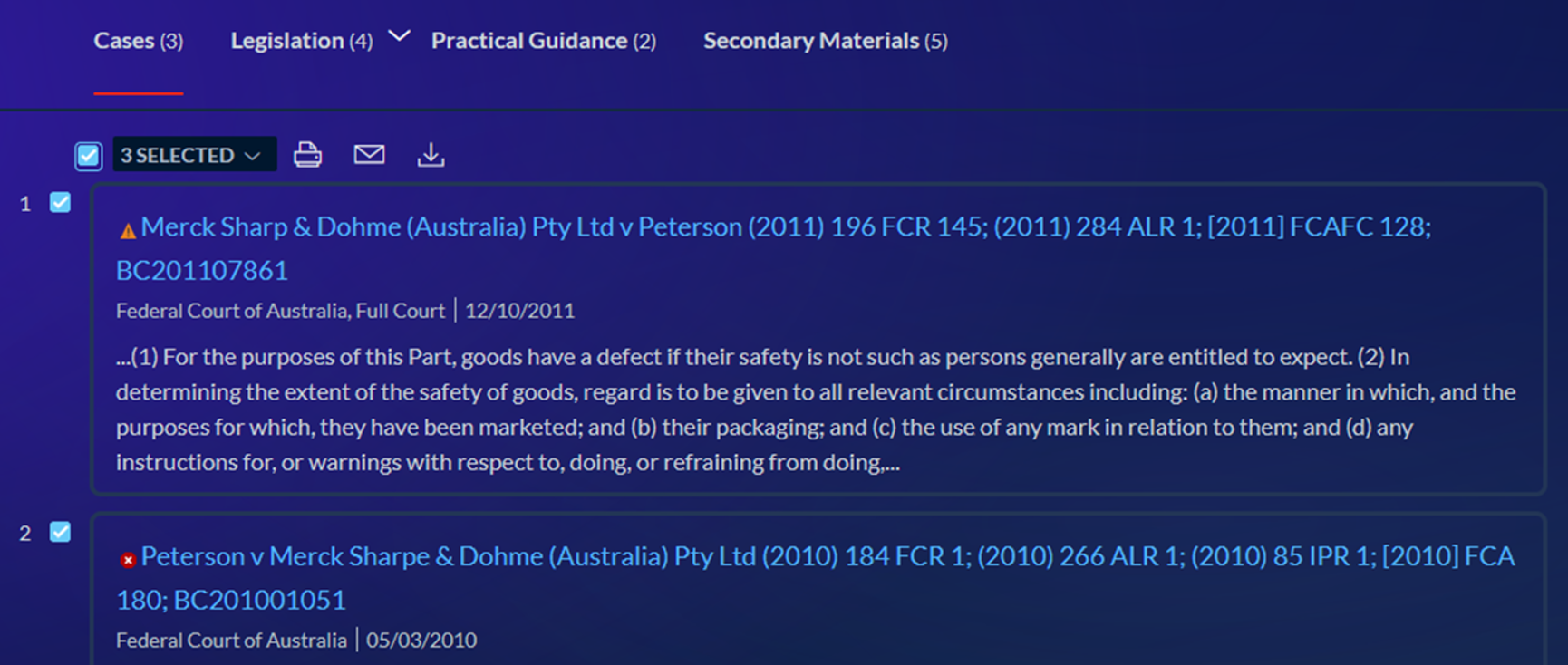
- Default Jurisdiction Setting: You can now set one jurisdiction as your default jurisdiction from within the Select Jurisdiction menu. This selection will persist across your tasks.
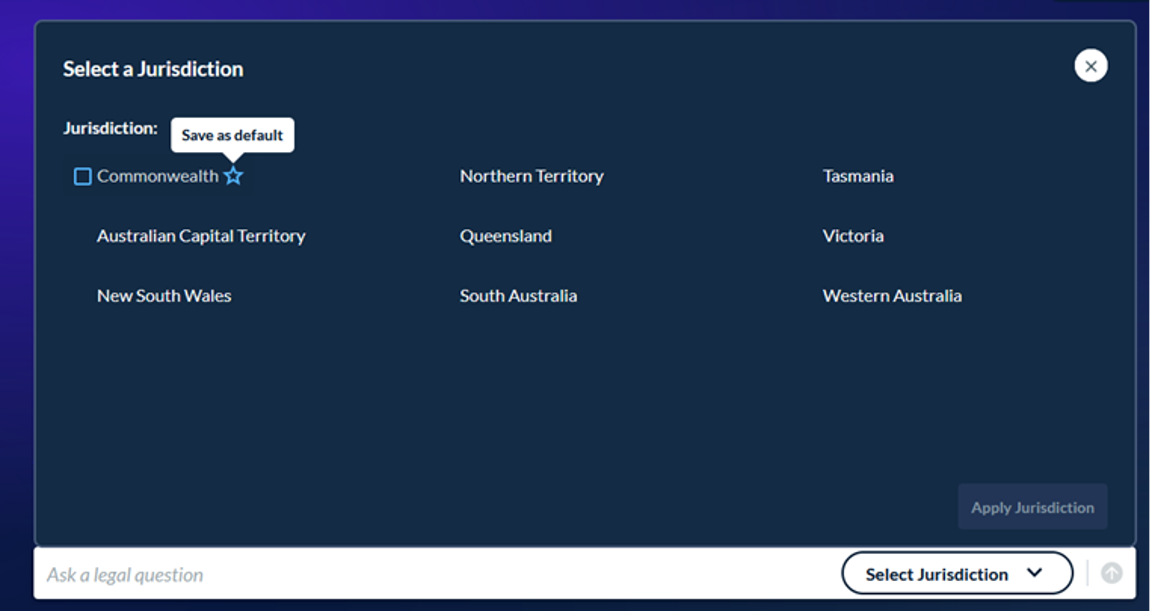
- Seamless Tab Navigation: Responses now continue to stream while you navigate to other tabs.
- Upgraded Language Model: Lexis+ AI now uses GPT-4o for more advanced and accurate performance.
- In-line links: Links to relevant documents can be found within the body of the generated response.
- ‘View Related Materials’: At the end of each response, click on the ‘View Related Materials’ link to transparently see the related documents the AI used to support its answer, grouped under content types such as Cases, Legislation, Practical Guidance, and Secondary Materials.
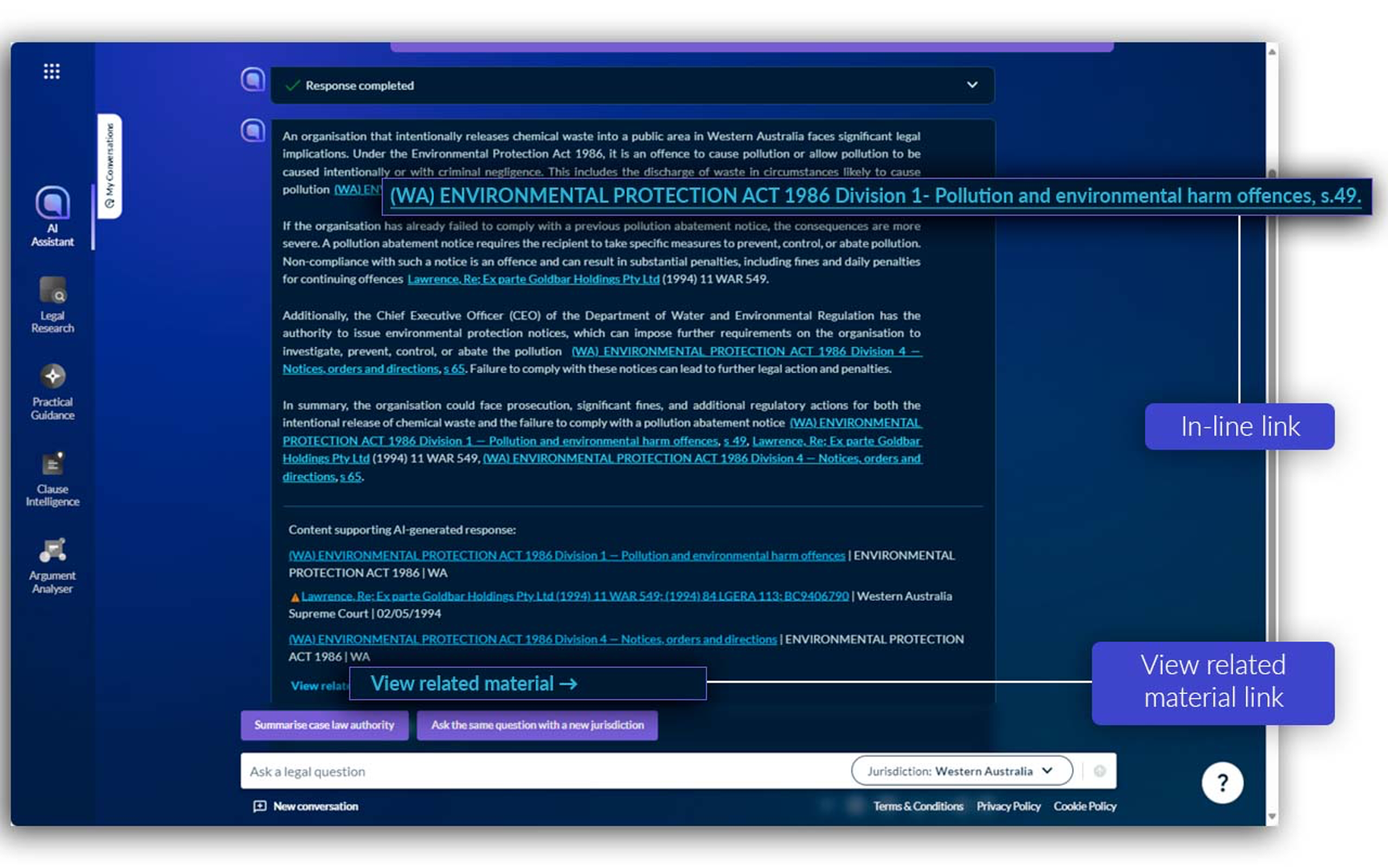
- Text Snippets: Small snippets of the text extracted from those documents are also provided to give you a brief look at the content used.
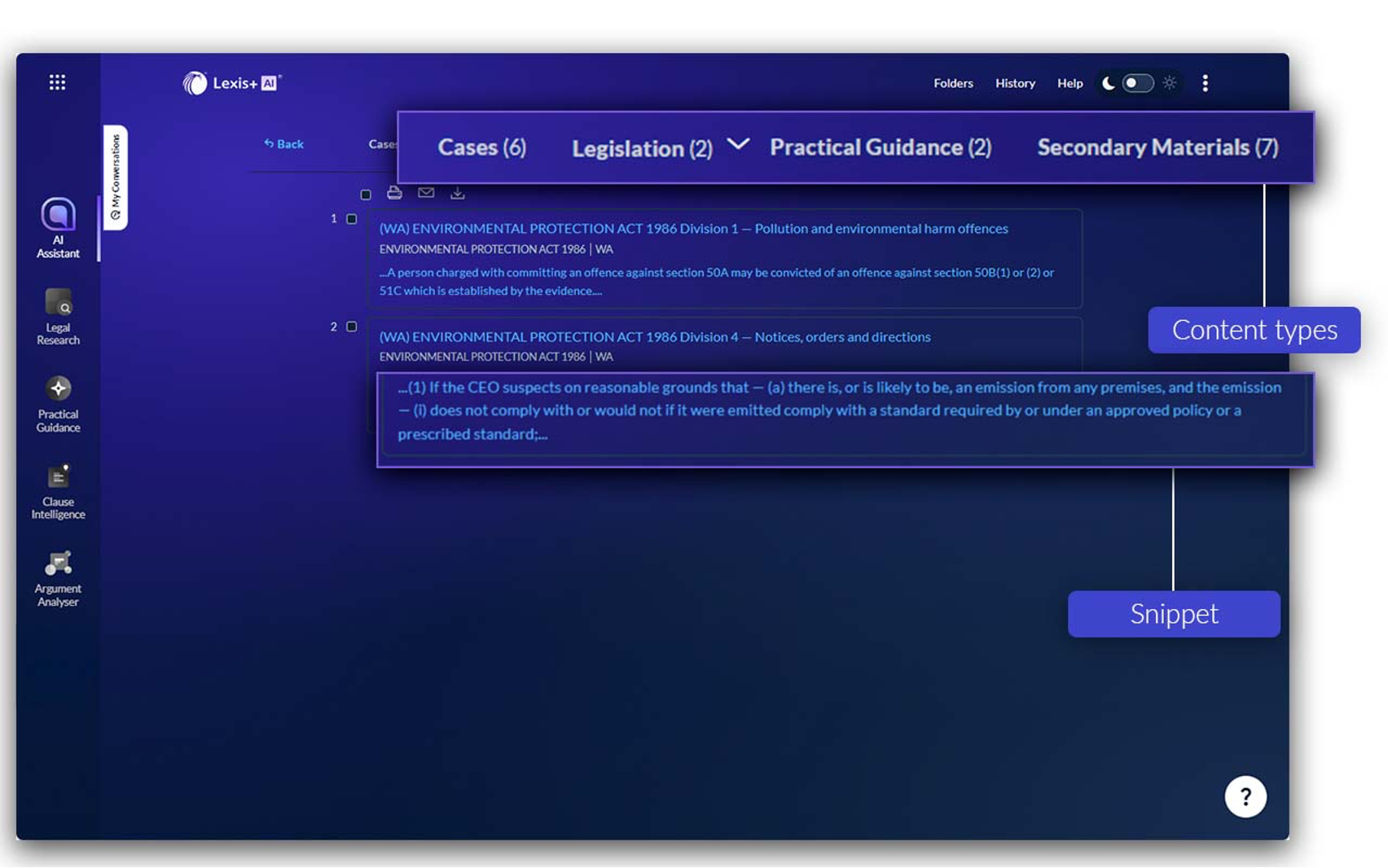

- Legislation Compare: Legislation Compare is an easy way to compare two versions of the same legislation and reduce the time taken to review how the law has evolved over time.
- Leading Cases: Lexis+ surfaces the cross-references to important cases for a legislative provision reducing search time and supporting legal research to drive better and more precise outcomes.
- Practical Guidance: Fully integrated practical guidance experience including practice notes, precedents, checklists, drafting tools, and industry insights from leading practitioners now easily accessible from the home page and within legal research results.
- Lexis Answers®: Responds to natural language search queries with the best, most relevant answers from Caselaw taking users to its location within the document.
- Enhanced AI-Powered Search Capabilities that give lawyers more control over their research experience, including:
- Search Tree: Graphically depicts Boolean searches and highlights the impact of each keyword on search results, enabling users to refine and feel confident for the best results.
- Search Term Maps: Visually depicts clusters of terms within search results and documents across major content types for fast, easy navigation, trend identification, and direct access to the most relevant information.

- Best Practice Guidelines from the Australian Bar Association will be featured in Volume 55 Part 3 of the journal.
- Keynote addresses from future Australian Bar Association conferences are set to be published in the Australian Bar Review, ensuring broader access to thought leadership in the field.
In December 2024, the High Court handed down the decision of Pafburn Pty Ltd v Owners - Strata Plan No 84674 [2024] HCA 49, ultimately dismissing an appeal concerning the availability of proportionate liability defences under Pt 4 of the Civil Liability Act 2002 (NSW) (CLA) to a developer and head contractor facing claims of breach of their duty under the Design and Building Practitioners Act 2020 (NSW) (DBPA) to exercise reasonable care to avoid economic loss caused by building defects arising from construction works. The majority held that the DBPA duty was non-delegable in nature and so could not be apportioned, in part because it was subject to the requirement contained in s 5Q of the CLA that liability in the breach of non-delegable duty be determined as if it were vicarious.
Civil Liability Australia author Richard Douglas has updated a number of paragraphs under the Proportionate Liability guidecard to include reference to Pafburn. This updated commentary contextualises the decision in apportionable claim principles and so is not only useful to those specifically working in matters relating to the construction industry but will also benefit any practitioner seeking a robust and up-to-date understanding of proportionate liability. Dr Matthew Bell, Associate Professor at Melbourne Law School, has written a detailed article in the Australian Construction Law Bulletin on the findings of the High Court in this case. He examines the High Court's interpretation of the proportionate liability provision in the CLA and the statutory duty scheme under the DBPA and compares the majority v minority findings where the decision was spilt 4:3. This article is a valuable resource for practitioners seeking guidance in an area of construction law that is expected to undergo further reform in the near future.
The Federal Government has recently passed the Treasury Laws Amendment (Financial Market Infrastructure and Other Measures) Bill, which came into effect on 1 January 2025. Amongst others, the Act amends the Corporations Act and mandates sustainability reporting to be included in annual reports generated by Australian corporate entities. This is to ensure that entities make it known if there are material financial risks or opportunities relating to climate.
Ian Ramsay, lead author of Ford, Austin and Ramsay's Principles of Corporations Law, has conducted a comprehensive review of 14 chapters to address this legislative amendment and other relevant items, ensuring that Ford remains in touch with the latest updates to the Corporations Act and continues to be a very reliable source of information for users.
The High Court has decided whether a Sydney law firm should recover the costs for work done by its own solicitors. In Birketu Pty Ltd v Atanaskovic [2025] HCA 2, the High Court majority upheld a 2-1 decision of the NSW Court of Appeal in Atanaskovic v Birketu Pty Ltd [2023] NSWCA 312, holding that an order for costs in favour of an unincorporated law firm entitled the firm to obtain recompense for legal work performed by an employed solicitor of the law firm on the basis that this was an application of a broader common law principle limiting recoverable professional legal costs to those actually incurred by a litigant for services rendered.
The author of Legal Costs South Australia, Associate Aux Justice Peter Norman, noted this very recent case and immediately drafted updates addressing the effect of this High Court judgment. This case has wide-ranging implications for all self-represented law firms. This case’s importance was noted by the High Court as one that required them to “resolve differences of opinion both between different intermediate courts of appeal and within the one intermediate court of appeal.” And in ruling, the HCA made the important ruling that the “time spent on the doing of legal work that is capable of recompense is not that of the solicitor or firm but that of employees of the solicitor or firm in respect of which the solicitor or firm incurs expenses of remuneration and overheads. The recompense is to the solicitor or firm for professional legal costs thereby actually incurred by the solicitor or firm.” It has very important consequences for all firms involved in self-litigation and makes clear where costs can be claimed for by in-house lawyers, and, importantly, what sorts of items are claimable.
The Making Queensland Safer Act 2024 received assent on 13 December 2024, with many sections coming into effect from that date, including amendments to the Youth Justice Act 1992. These amendments cover the treatment of youth offenders and the principles to be considered for bail, detention, and sentencing. Further amendments to the Youth Justice Act 1992 will come into effect on a date to be determined by proclamation.
Carter's Criminal Law Queensland author Danae Younger is working on updating the annotations to these amended sections to ensure customers have access to the most up-to-date commentary possible. These are highly publicised amendments in the youth justice system in Queensland and practitioners will benefit from timely commentary on the changes being made.
What is meant by the phrase “exceptional circumstances” for the purpose of conditionally releasing people convicted of an offence under federal law was considered in R v Bredal [2024] NSWCCA 75. Bredal was a Crown appeal against a sentence where the judge found there were exceptional circumstances and immediately suspended sentence in relation to an offence of online grooming of a person under 16 years (who was in fact a fictitious assumed identity operated by police) by a middle-aged man. The appeal was dismissed on the basis that the finding of exceptional circumstances was open to the judge. Whether the finding is open depends upon all the circumstances of the case, including the seriousness of the offence.
This case was discussed in several annotations in 2025 updates for Federal Criminal Law. This case clarifies an important area of law, and the annotations dealing with this case are succinct and to the point, presenting customers with the import of the case in an easily digestible format.
Stage 2 of the Model Defamation Provisions was enacted in NSW and the ACT on 1 July 2024, with Victoria following on 11 September 2024.
Judge Judith Gibson has updated the Tables and Statistics chapter in Australian Defamation Law and Practice. 2024 was a significant year of change within the defamation space, with Stage 2 of the defamation reforms being enacted, first in NSW and the ACT, with Victoria following in September. The Stage 2 reforms were split into two parts, with Part A notably targeting defamatory content published online, with a strong focus on digital intermediaries, as well as providing exemptions for intermediaries who play a significant role in publishing content (such as social media platforms). Judge Gibson's update includes a detailed table of all of the hearings which went to final trial during 2024, providing short summaries on the ambit of the publications involved, the facts, the result, and the award of each case. The update also includes commentary which discusses key trends, and statistics, as well as how the reforms are affecting defamation trials. This update aims to supply readers with summaries of not just the most significant cases which went to final trial of 2024, but also discusses lesser-known cases - providing a complete view of the state of defamation law and trials heading into 2025, with the added benefit of insightful statistics highlighting the trends affecting defamation law following the reforms.
The High Court of Australia (HCA) recently handed down a significant decision on employment law in Elisha v Vision Australia Ltd [2024] HCA 50 and ruled that employers may be liable for psychiatric injuries caused by poorly managed disciplinary processes. Some of the key takeaways for employers from this HCA decision include the importance of implementing and administering fair and transparent disciplinary processes in a workplace.
McCullough Robertson Lawyers are our expert authors for the Occupational Health and Safety Law NSW (OHSN) publication. They are updating the Civil Liability chapter to address the significance of this decision, which overturns a long-standing position regarding psychiatric injuries in a workplace. Employees will now be able to seek damages for psychiatric injury arising from an employer’s breach of their employment contract. Employers are reminded to adopt a fair and careful approach when implementing and administering disciplinary and termination processes, to be mindful of the impact of it on employees, to remember to review existing policies and employment contracts, to be aware of the legal risks when considering terminating an employee’s employment, and other matters.
In Pachis and Turnbull [2024] FedCFamC1F 420, the Family Court considered what constitutes a ‘significant change’ in circumstances since the final parenting order has been made in a parenting matter. The court must consider various matters including the basis of the original order, new material available, the impact of a new order, and any potential benefit or detriment to the child of a change of order.
Expert family law author Michelle Daniel has reviewed and updated the entire set of Family: Parenting precedents within the Australian Encyclopaedia of Forms and Precedents in light of this case and the relevant legislation, and has authored detailed introductory notes to explain the case and the legislation. The introductory notes also contain commentary on issues to be considered, how to use each precedent, and relevant practice directions and notes on filing documents with the FCFCOA. This is an invaluable resource for customers working in the family and parenting practice areas.
The Government unveiled its Migration Strategy on 11 December 2023, featuring 25 new policy commitments, including the Skills in Demand (SID) visa, which replaces the Temporary Skills Shortage (TSS) visa. This new visa aims to enhance worker mobility, offer better pathways to permanent residency, and address specific workforce needs. The SID visa was officially launched on 7 December 2024, alongside reforms to the subclass 482 visa nomination and legislation.
Helen Duncan discusses the new skilled visa subclasses in an article titled 'Work Experience and Australian Visas' in the upcoming 101st issue of Immigration Review.
The Online Safety Amendment (Social Media Minimum Age) Bill 2024 received assent in December 2024. The new legislation, which amends the Online Safety Act 2021, enforces a minimum age of 16 years for social media access and use, putting the responsibility on social media platforms, not parents or young people, to take measures to ensure crucial protections are in place. The Bill is considered a significant step towards protecting young people and children by creating an obligation on "age-restricted social media platforms" to take responsible steps to safeguard the health and well-being of young social media users. The Bill will come into force in December 2025.
Julie Chandra, one of the authors of Communications Law and Policy Law in Australia, has recently revised the Online Safety Act 2021 commentary to cover the new legislative scheme. In her update, Julie delves into the potential dangers that young people face when using social media, drawing on various case studies to illustrate these risks. She also provides a detailed explanation of which services are now considered "age-restricted social media platforms," ensuring that readers fully understand their responsibilities under the new law. Furthermore, Julie emphasises the crucial steps that organisations need to take and implement in preparation for the legislation's enforcement at the end of this year.

- Environmental Planning and Climate Law in Queensland, 2nd edition, available now
- LNQA Administrative Law, 4th edition, available now
- LNSG Administrative Law, 4th edition, available now
- The Law of Liability Insurance, 4th edition, available now

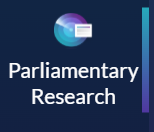
Unlock unique insight with Lexis+ Parliamentary Research, powered by Capital Monitor
- Search to browse headlines across Parliamentary resources including bills, gazettes, Hansard, and media from Capital Monitor within Lexis+.
- Bills Monitor to follow the movement of Bills from introduction to assent with live updates available when Parliament is in session.
- Quick View by Topic to track updates across a carefully curated list of entities and areas of interest.
- Daily Updates feed with access to top headlines, recent Acts, scheduled events, and political calendars for upcoming Parliamentary sessions, Estimates, Budgets, Elections, and more.
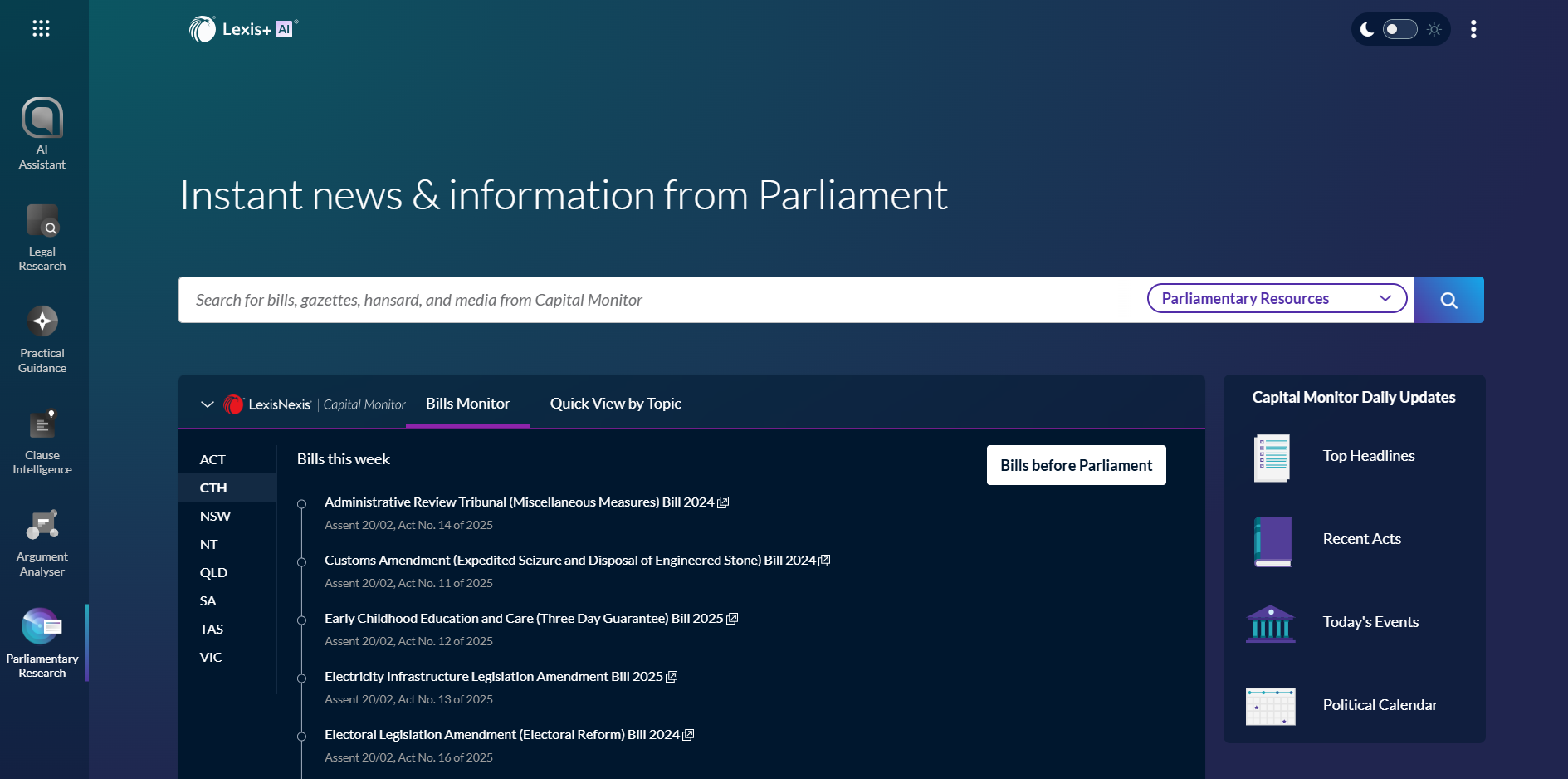


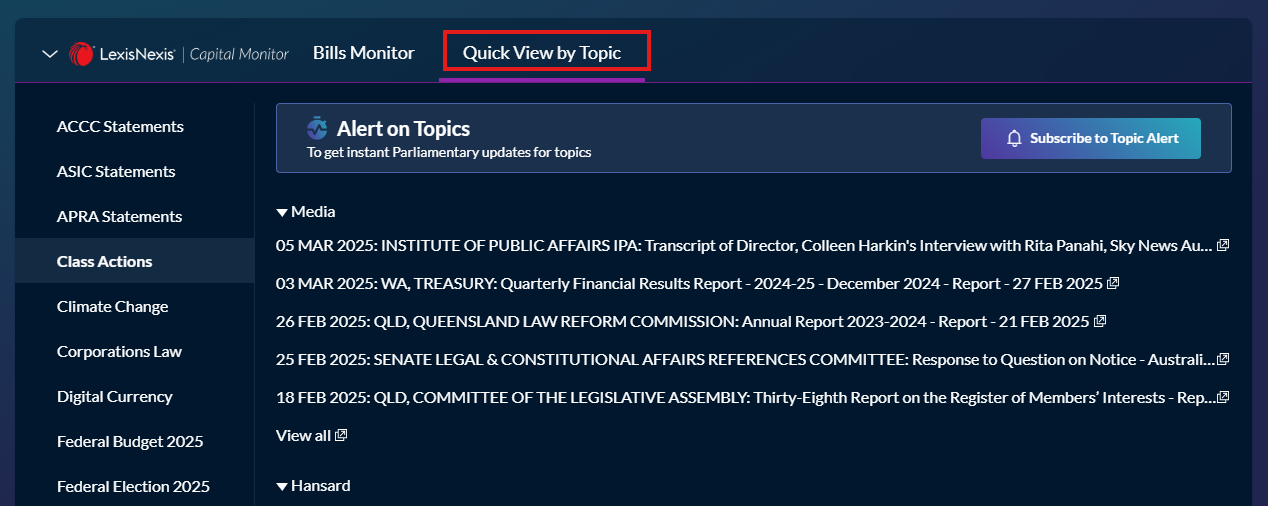

Click Top Headlines to view the title and extract of curated content.
Capital Monitor subscribers can click download to view a document in full.

Click Recent Acts to view the list of Acts for each jurisdiction and see the Date of Assent.

Click Today's Events to identify which Parliament jurisdictions are sitting.
Capital Monitor subscribers can access the Diary and Calendar for more detailed information,
helping you plan your day around key events.

Click Political Calendar to view key events for each jurisdiction, such as when Parliament is next sitting, Budgets
are being handed down, Budget Estimates are scheduled, etc.

- Drive efficiencies in their workflows, by saving research time.
- Enjoy access to comprehensive international coverage, with concise summaries of market definitions and remedies which have been translated into English.
- Advise with confidence that you have access to competition law regulators’ market definition and merger remedies decisions, enabling compelling and timely submissions.
- Improve outcomes while managing risks, with access to routinely updated decisions – helping you safeguard the reputation of your firm.



- Enter the command and term in the Search Within Results field and click the search icon to refine the results.
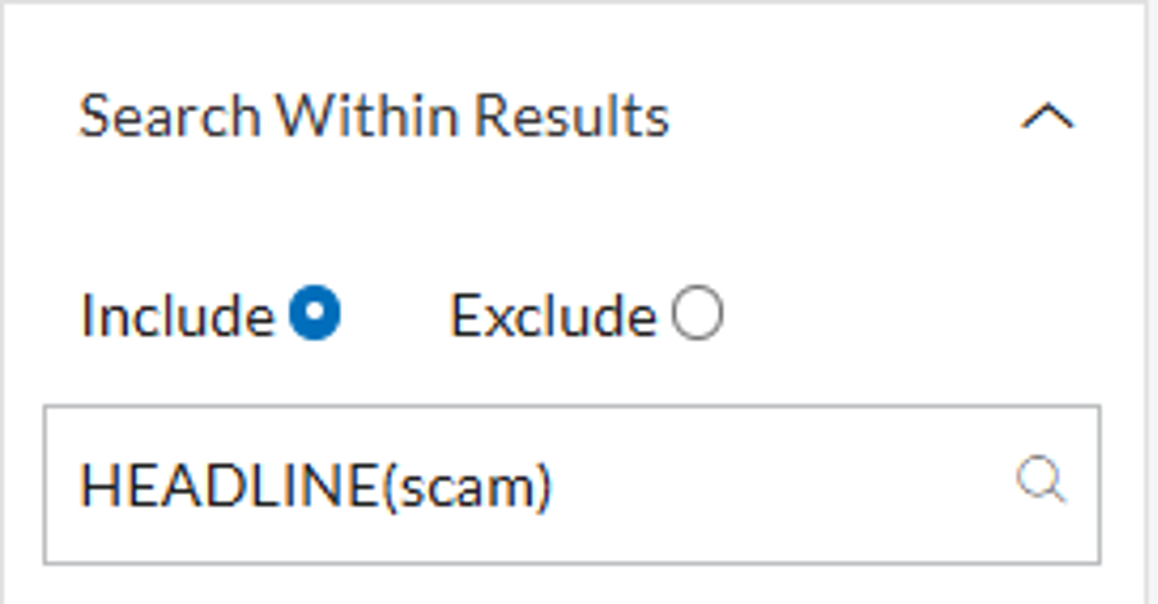
- HEADLINE(scam) – will retrieve articles where the scam appears in the headline field only
- HLEAD(scam) – will retrieve articles where scam appears in the headline and first paragraph of a document

- Click on the three dots to the right of the folder name and select Download search criteria
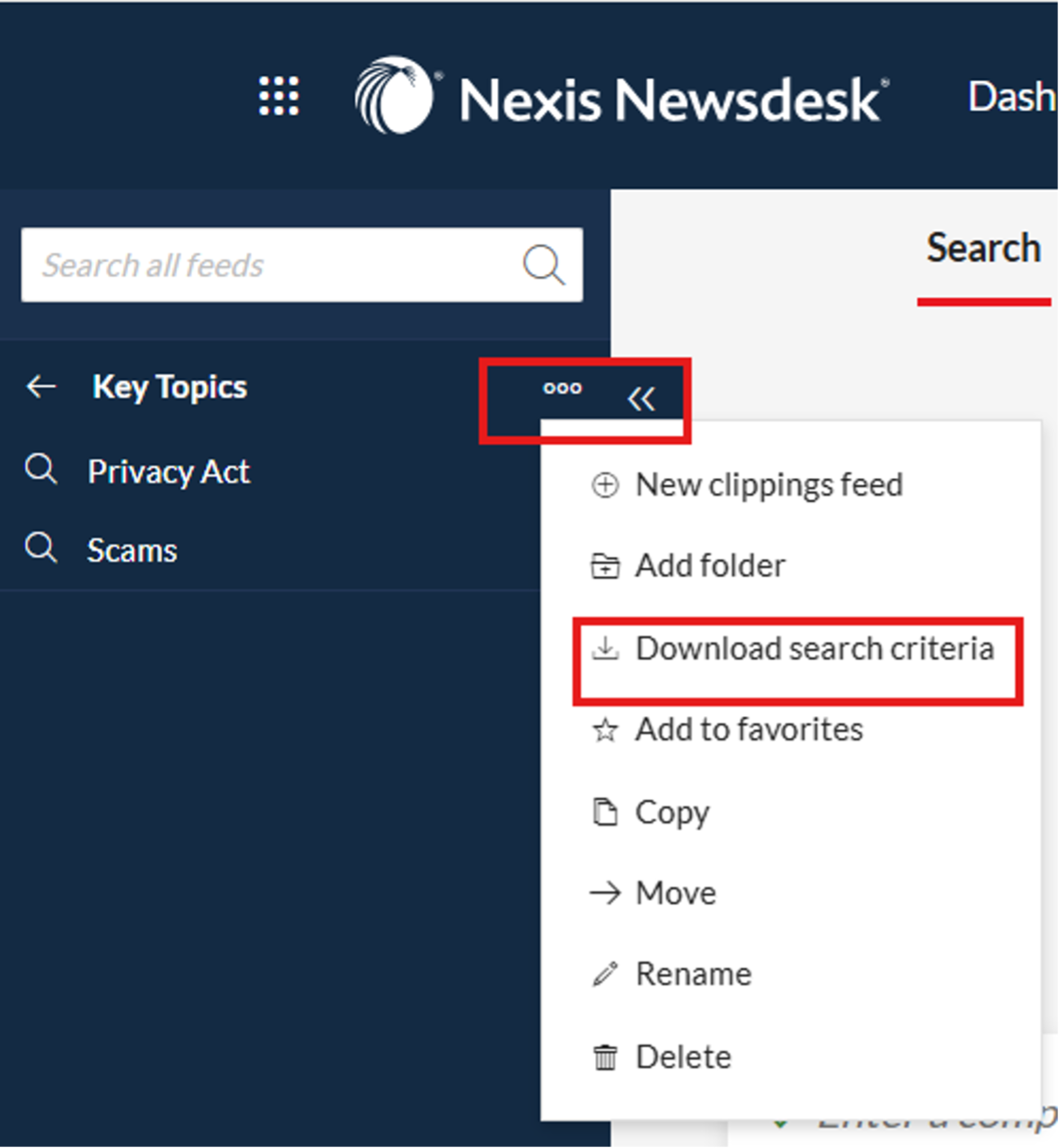
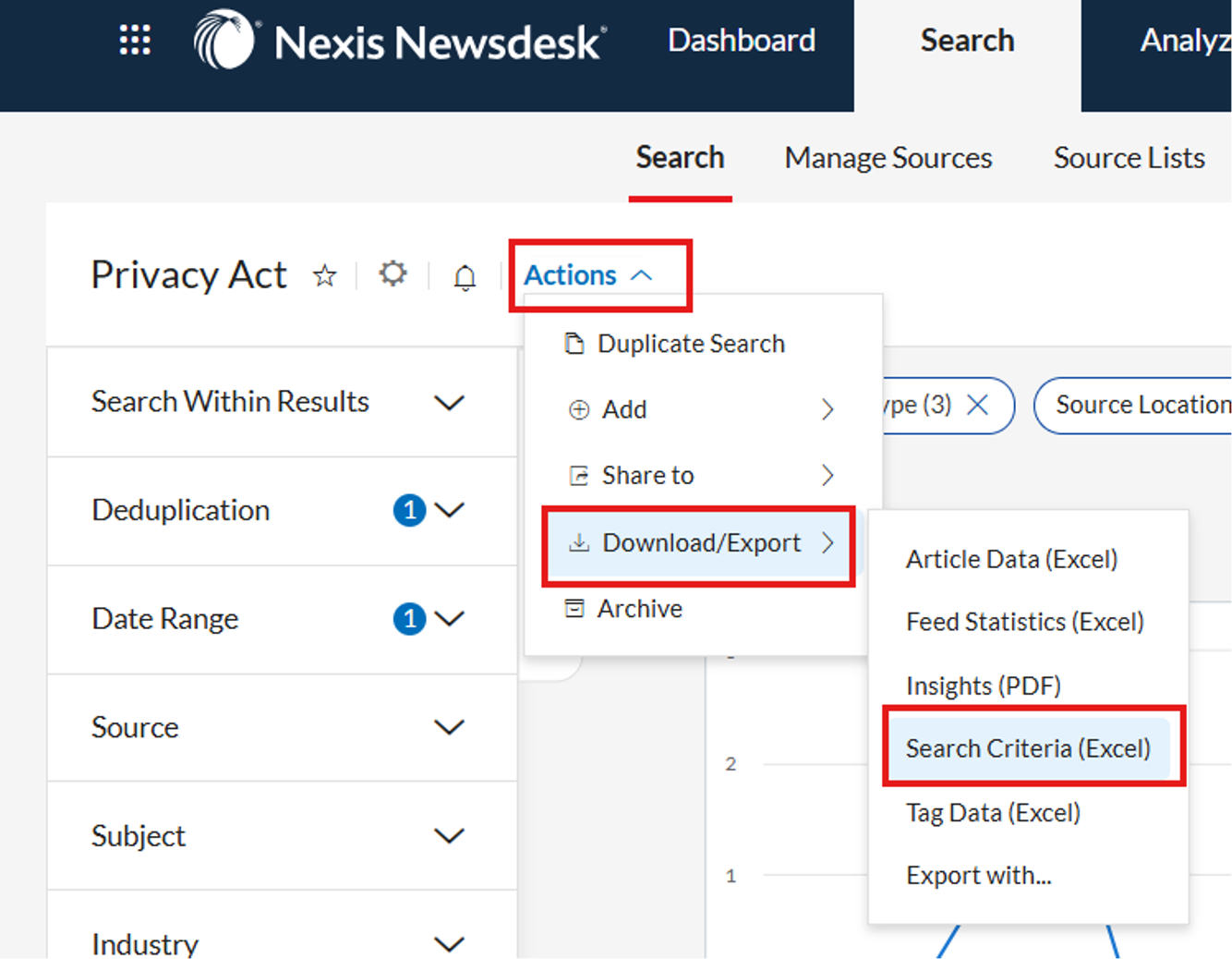

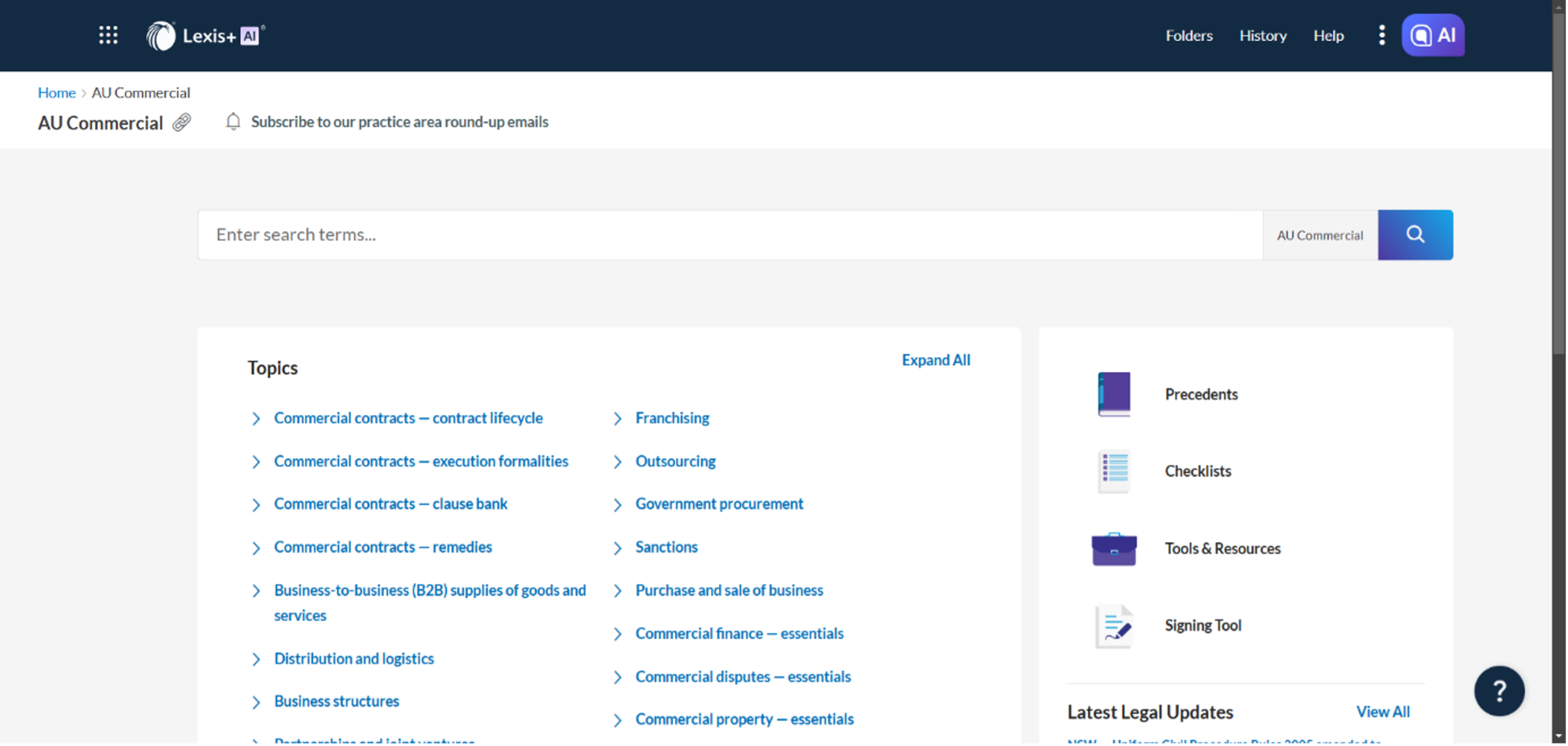
New | Guidance on AML/CTF reforms
The long-awaited Anti-Money Laundering and Counter-Terrorism Financing Amendment Act 2024 introduces significant reforms to the AML/CTF regime, including extending the regime to professional services providers such as lawyers, accountants and real estate professionals. Our initial guidance package will assist in preparing for compliance under the proposed regime and includes:
- Guidance Note: AML compliance for professional services providers (PSPs) under the proposed regime
- Guidance Note: AML compliance for real estate professionals under the proposed regime
- Checklist: Preparing for AML compliance under the proposed regime – key steps for PSPs and real estate professionals
- Guidance Note: Understanding the scope of the proposed AML regime for current responsible entities
Coming soon | New topic: Debt capital markets
Our new topic will assist those advising Australian issuers, arrangers, and dealers on debt capital markets transactions. The topic will provide comprehensive guidance on:
- the types of debt securities (including zero coupon securities) prevalent in the Australian wholesale market
- key provisions in debt capital market transactions in Australia, with some comparison to market practice for international issuances
- documenting an Australian medium-term note (AMTN) programme
- the steps for establishing and issuing notes under an AMTN programme, and
- listing debt securities on the Australian Securities Exchange (ASX).
New | Subtopic: Powers of attorney
A new subtopic in the “Agency” topic provides guidance about powers of attorney in each jurisdiction, including a precedent power of attorney for a company to appoint an individual attorney to execute documents and other attorney-related precedents.
New | Corporations: Essentials
New streamlined corporations guidance to replace the former “Corporations law” topic. This “essentials” topic includes consolidated guidance on the fundamentals of corporations law for commercial practitioners, including corporate governance and compliance, directors’ duties and liabilities, and corporate transactions and restructuring.
New | Precedents: Partnerships
New precedents for general partnership agreements (long form, short form, and existing business), notice of partner retirement from general partnership, and notice to dissolve general partnership.
New | New topic: Partnerships and joint ventures
New topic providing guidance on general partnerships, limited partnerships, and joint ventures.
New | Toolkit: Competition law horizon scanner 2025
New toolkit providing key dates, cases to watch, and reviews on the horizon for competition law in 2025. The toolkit also provides links to relevant Practical Guidance Competition content and external resources.
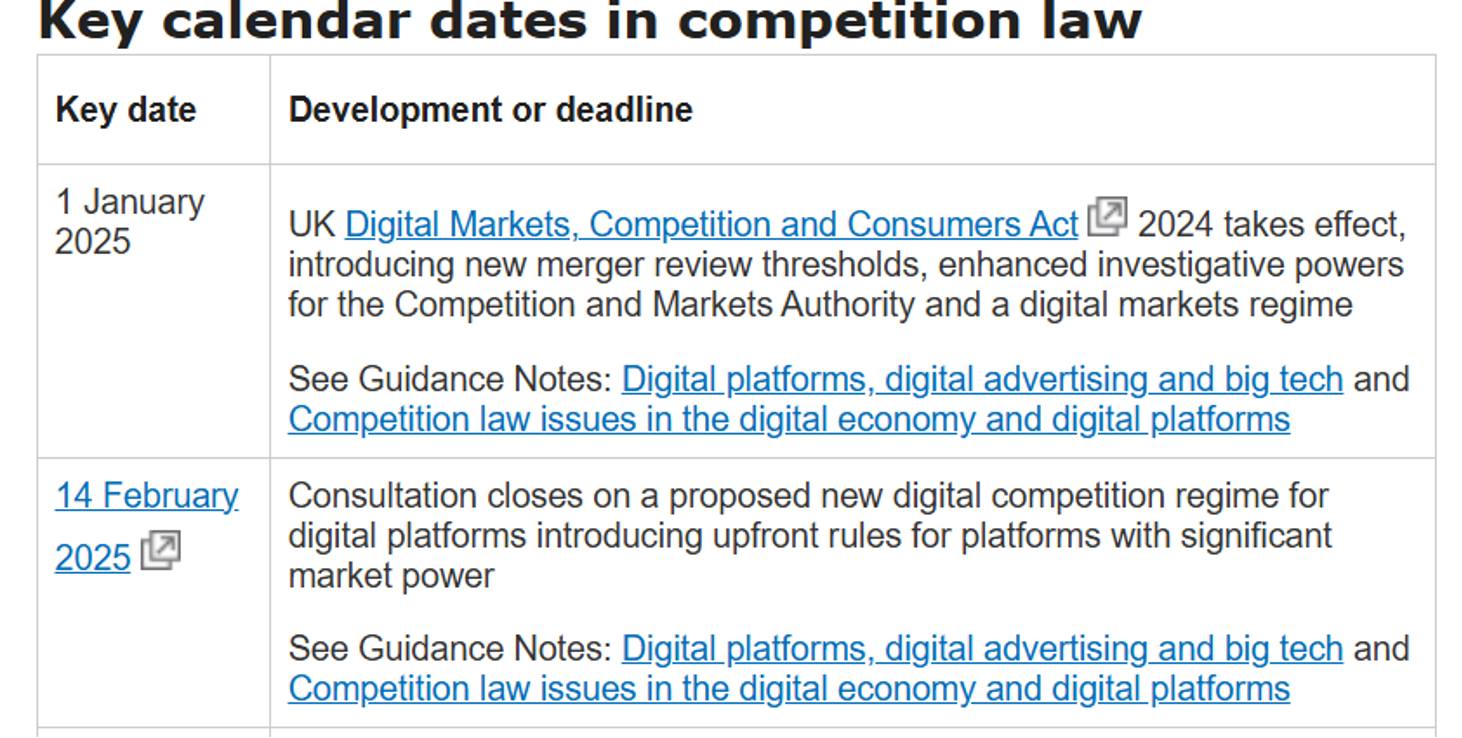
New | Subtopic: Sector-specific access regimes
New subtopic providing guidance on access regulation in the telecommunications sector and electricity, gas, and clearing and settlement access regimes. The first guidance note provides information on Pt XIC of the Competition and Consumer Act 2010 (Cth) (CCA), which sets out the telecommunications services access regime that allows wholesale access to certain “declared” services from other carriers. The second guidance note in this new subtopic provides an overview of access regimes under federal, state, and territory laws that are not regulated by Pt XIC and Pt IIIA of the CCA.
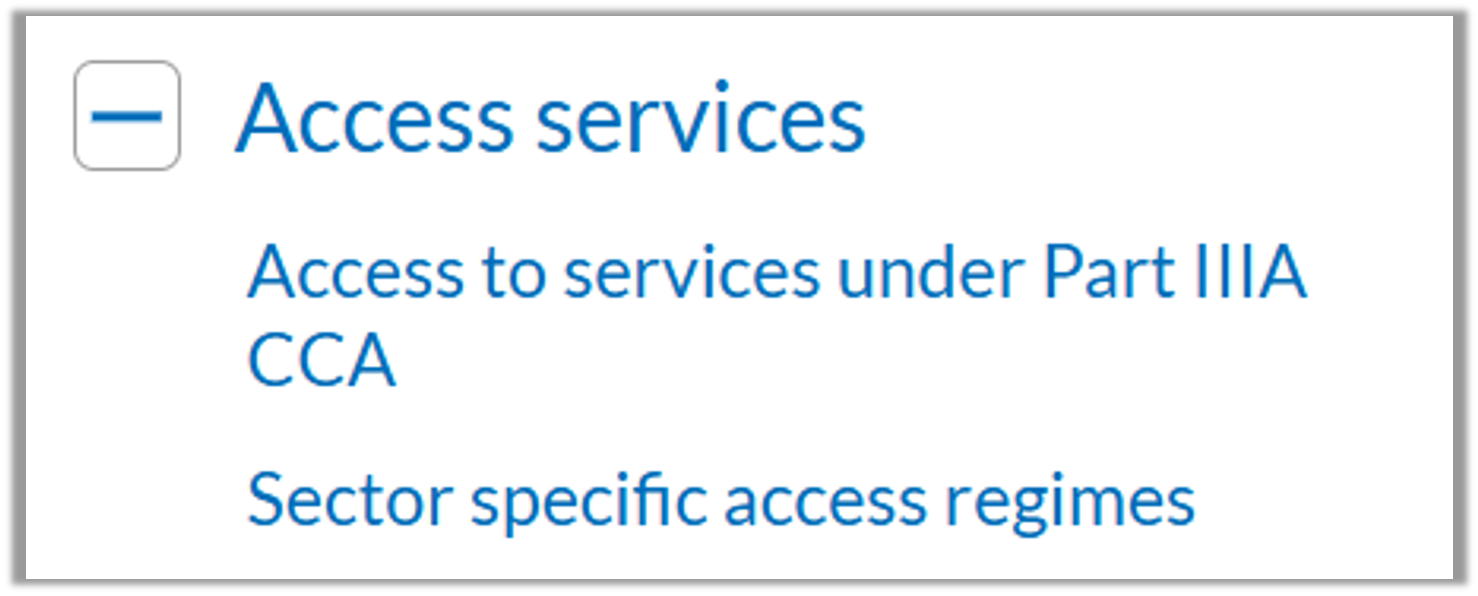
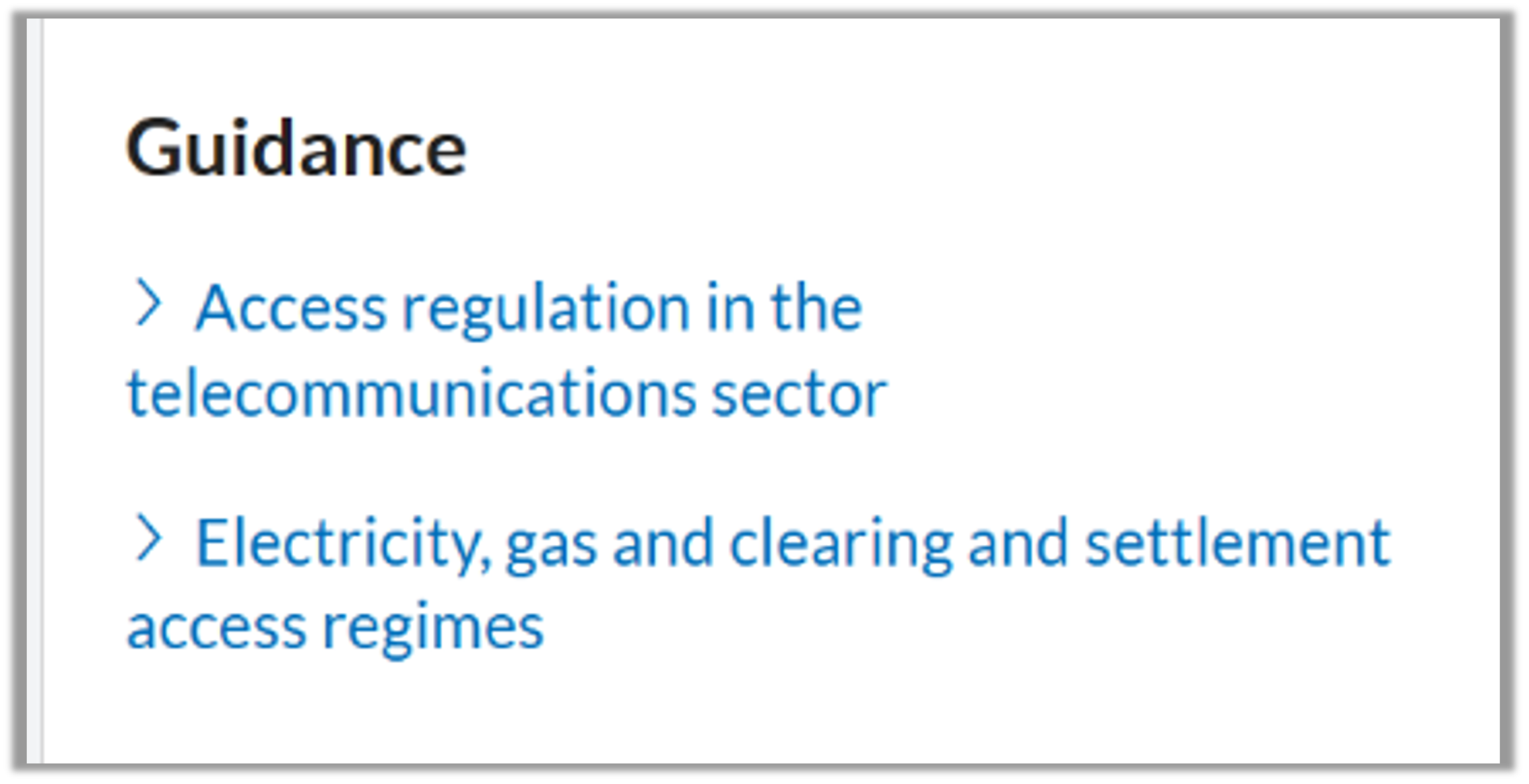
Coming soon | New guidance on undertakings
New guidance on behavioural undertakings to reflect the Australian Competition and Consumer Commission’s (ACCC) increased willingness to accept behavioural undertakings to resolve or limit competition concerns. The guidance will include an expanded list of recent examples where the ACCC has accepted a behavioural undertaking to alleviate its competition concerns, including in the 2024 Chemist Warehouse/Sigma merger decision.
Coming soon | New subtopic on the new merger review system
Comprehensive guidance on Australia’s new merger review system, which will take effect on a voluntary basis from 1 July 2025 and mandatorily from 1 January 2026. The new subtopic will provide a snapshot of the new system, detailed guidance on the new merger review process and the amended merger test, and a checklist that will briefly list best practice steps and/or decision points of the merger review process.
Coming soon | New toolkit on collective bargaining
A new toolkit/quick guide providing a list of all relevant Practical Guidance content on collective bargaining.
New | Tool: Remedies available under the Australian Consumer Law
The Australian Consumer Law (ACL) provides a range of remedies for breaches of its civil and criminal provisions, including pecuniary penalties, injunctions, adverse publicity orders, and non-party redress orders, as well as specific remedies for breaches of certain provisions, such as those relating to unfair contract terms and the consumer guarantees. This new quick-reference tool summarises the remedies available to both private litigants and regulators in pursuing civil and criminal proceedings under the ACL, with links to each provision.

Updated | Topic: Franchising
Our revised and enhanced franchising content covers the fundamentals of franchising as related to consumer law. This includes guidance on the Franchising Code of Conduct. The ACCC’s regulatory and enforcement role in franchising and the framework for dispute resolution.
New | Topic: Current issues in corporations law
Our new Current Issues in corporations law topic provides guidance on ESG issues for corporate lawyers, hot topics and emerging trends, and regulator priorities. This topic will provide detailed guidance on specific ESG issues as well as other key issues facing boards such as continuous disclosure, compliance with the draft 5th edition of the ASX Corporate Governance Principles and Recommendations (soon to be released in final form) as well as practical steps for directors to ensure compliance with their directors’ duties in the context of environmental and technological developments.
New | Tool: ASIC regulatory enforcement priorities for 2025
A new infographic summarising ASIC’s areas of enforcement focus for this year, including industries and types of conduct the regulator has identified for particular scrutiny. A summary of ASIC’s enduring regulatory priorities is also included.
Coming soon | Executive remuneration
Updated guidance on executive remuneration including guidance on the updated Recommendation 8 relating to executive remuneration set out in the draft 5th edition of the ASX Corporate Governance Principles and Recommendations. The updated guidance will also cover the impact of shareholder activism relating to executive remuneration and practical measures which boards can take to reduce exposure to shareholder activism.
Coming soon | Directors’ duties matrix
Guidance for directors and their advisors on the scope of directors’ duties in relation to regulatory and legal landscape environmental and technological issues such as ESG, AI, and cyber risk which includes practical steps for directors to ensure that they discharge their duties.
Coming soon | AI governance checklist for boards
Complementing the directors’ duties matrix guidance (also coming soon), this checklist will provide practical guidance for boards to enable them to navigate the risks and opportunities of AI and governance issues, in order to meet their obligations.
Updated | Consumer Data Right
Updated topic on consumer data rights. With the introduction of action initiation (also referred to as “write access”), consumers will be able to permit service providers to initiate actions on their behalf in relation to their data. The government has indicated that priority use cases will include energy switching and mortgage switching.
Updated | Transfer of data
As a general guide, personal data in Australia may be equated with the definition of “personal information” under the Privacy Act 1988 (Cth) (Privacy Act). The transfer of such data (and its collection) overseas by Australian-based organisations is primarily regulated by the Privacy Act and within the Privacy Act the Australian Privacy Principles (APPs). This topic has been updated.
Updated | EU General Data Protection Regulation (GDPR)
The GDPR is a regime of personal data protection requirements adopted by the European Parliament which regulates “personal data”. While the GDPR is European Union law, it has extra-territorial reach. If the GDPR applies to organisations, they may need to make a number of significant changes in order to ensure compliance. This topic has been updated.
Coming soon | New topic: Cloud
Cloud computing is the shift of software or infrastructure away from the physical possession of the customer and into a shared common location controlled by a third party which is accessed by the customer through the internet or a private network. Rather than incurring capital expenditure or ongoing software licence fees, the customer pays for its usage on a subscription basis. This topic will cover legal issues relevant to cloud computing.
Coming soon | New subtopic: Cyberthreats and cyber events
New guidance covering business email compromise, ransomware, and data extortion, insider threat, and inadvertent disclosure, and supply chain attacks.
New | Subtopics: Discovery in class actions & Evidence in class actions
Two new subtopics covering practice and procedure associated with the discovery processes and evidence frameworks in each Australian class action regime, including lay evidence, expert evidence, and how to manage discovery obligations from the perspectives of both class action plaintiffs, group members, and respondents.
New | Tool: Generative AI in civil litigation — practice notes and guidelines
A new tracker that identifies and tabulates the practice notes, protocols, and guidelines issued by Australian courts and other regulatory bodies across all jurisdictions in relation to the use of generative artificial intelligence in civil proceedings.
Updated | Subtopic: Vic – Supreme Court - Costs
Updated subtopic to reflect new time-based scale of costs that came into effect on 1 January 2025, together with updated guidance notes that reflect the operational and procedural changes in the Costs Court of the Supreme Court occasioned by the latest revision of the Costs Court practice note.
Updated | Topics: New South Wales courts – new Gen AI rules
Updated subtopics across New South Wales courts topics to reflect the recent amendments to the Uniform Civil Procedure Rules 2005 (NSW) concerning the use of generative artificial intelligence when preparing affidavits, witness statements, expert reports, written submissions, and appeal documents.
Coming soon | Topic: Digital evidence and AI in civil litigation
New topic concerning the role and use of digital evidence and artificial intelligence in civil proceedings in Australian courts, including practical tips for managing litigation involving social media platforms and telecommunications services providers.
Updated | Underpayments
Updated subtopic to reflect the recent changes to the Fair Work Act 2009 (Cth), and the introduction of criminal penalties for the intentional underpayment of wages and certain entitlements. The guidance notes in this subtopic have been updated with information about the elements of the offence of ‘wage theft’, available defences, and the relationship between the Fair Work Ombudsman and the Australian Federal Police in pursuing such matters.
Updated | Underpayment and wage theft training material
The white label training material has been updated to include information about the federal criminal offence of ‘wage theft’. The training material will allow organisations – particularly large organisations or those with complicated payroll structures – to conduct training in respect of the new offence and ensure those charged with compliance with the Fair Work Act are aware of their obligations and potential liability.
Updated | ESG checklist
Checklist for ESG reporting and disclosures now includes guidance on complying with the mandatory climate-related disclosures regime that commenced on 1 January 2025.
New | Good Governance Guides
New Good Governance Guides covering technology issues such as cyber security, digital transformation, ethical AI, generative AI, and technology governance.
New | Legal operations subtopic
New subtopic on Legal operations designed to assist in-house teams in measuring performance and implementing legal operations practices to improve efficiency.
New | Cybersecurity, Data Protection, and Privacy Frequent Tasks Tool
New Frequent Tasks Tool covering Practical Guidance Cybersecurity, Data Protection, and Privacy, and the tasks that are regularly performed in that practice area.
Updated | Directors’ guide to company financial distress
In December 2024, ASIC updated Regulatory Guide 217 Duty to prevent insolvency trading: Guide for directors, following consultation with industry, to provide new content on the safe harbour provisions for directors and their professional advisers. Our Guidance Note, which provides a broader practical guide for directors of companies in financial distress, incorporates the new guidance from the ASIC regulatory guide.
Coming soon | New precedents for Applications for release of liquidator and deregistration and supporting affidavit
These precedents provide practitioners with a head-start when preparing this liquidator application, adding to our bank of existing precedents for liquidator applications.
Coming soon | New bankruptcy content
Expanded practical content for common matters and issues that arise when practitioners act for either a trustee or bankrupt including:
- Discharge and annulment of bankruptcy
- Debtor applications to review, set aside of appeal against a sequestration order
- Directions and consolidation of estates
- Trustee applications for possession or sale of land, and
- Examination summonses under s 81.
Coming soon | Expanded administration and liquidation guidance
Expanded content on conflicts of interest in voluntary administration and liquidation. Will assist practitioners to navigate this ever-present and contentious issue for insolvency practitioners. Expanded content on making an application for leave to transfer shares in a company subject to a deed of company arrangement (DOCA). Will assist practitioner with share transfers under DOCAs, which offer flexibility for DOCA proponents.
New | Subtopic: Software & IP
New guidance on IP issues arising when developing software, commercialising strategies and risks, key terms of agreements, as well as managing and resolving disputes between a licensor and licensee.
New | Guidance: Indigenous cultural IP
Pending the introduction of statutory protection, it is considered best practice and part of good corporate governance (ie environment, social and corporate governance or ESG) for third parties to acknowledge and respect Indigenous cultural IP (ICIP). Building out our existing offering on ICIP, new guidance has been added on drafting ICIP clauses, and 4 new associated precedents with alternative clauses.
Updated | Subtopics: Patents; Registering and maintaining patents; Challenging patent rights
Updated guidance and checklists in 3 patents subtopics in IP fundamentals, and Registering and challenging patents. Expert patent attorneys have streamlined the content and enhanced it, including with more practice tips.
Coming soon | Precedent
New Confirmatory deed of assignment of IP, often used to file with the Patents office to confirm an assignment without including sensitive information.
New | Agreement Template
A new Agreement template precedent for practitioners starting a corporate or commercial agreement from scratch. The Agreement template contains commonly used defined terms, including Authorisation, Claim, Insolvency Event, Liability, Material Adverse Change, and Security Interest. It also includes customary interpretation provisions and boilerplate or back-end provisions, including GST, notices, governing law, assignment, and counterparts. There are helpful drafting notes, options, and alternatives to help practitioners navigate through these provisions and prepare an agreement that aligns with their legal requirements.
Updated | Subtopics: Workplace injuries – Statutory (no-fault) claims; Workplace injuries – common law claims
Updated guidance on ‘reasonable management action’, the ‘4 step test’ to determine whether someone is a ‘worker’ and journey and recess claims. Expanded guidance on establishing reasonable foreseeability in the content of psychiatric injuries.
Updated | Subtopic: General procedures (court procedures)
Updated guidance on applying for extensions of the statutory limitation period under s 31 of the Limitations of Actions Act 1974 (Qld).
Coming soon | Topic: Superannuation / Total and Permanent Disability (‘TPD’) claims
New topic to include practical guidance for practitioners to effectively run TPD claims that are commonly run concurrently with other personal injury claims.
Coming soon |Precedent: Schedule of Damages
New precedents for schedules of damages across the major areas of personal injury – motor vehicle accidents, workplace injuries, and public liability claims.
Coming soon | Institutional abuse claims
Updated guidance material in this growing area to reflect the landmark decision in Footscray Football Club Ltd v Kneale [2024] VSCA 314. It is expected that 2025 will see significant development of the law in this field.
Updated | Topic: Superannuation / Total and Permanent Disability (‘TPD’) claims
The module’s coverage of Victorian TPD claims has been reviewed and updated by a leading superannuation lawyer.
New | Guidance for property practitioners on the reformed anti-money laundering and counter-terrorism financing regime (AML/CTF regime)
Reforms to Anti-Money Laundering and Counter-Terrorism Financing Act 2006 (Cth) will extend the AML/CTF regime to professional services providers such as lawyers, accountants, and real estate professionals from 31 March 2026. The reforms will impact the way that lawyers, accountants, and real estate professionals deal with clients in fundamental ways. Our new guidance on the AML/CTF regime will assist in preparing for compliance under the new regime, and includes guidance on:
- what the current obligations under the AML/CTF regime are
- the application of the reformed AML/CTF regime to legal practitioners
- what the new obligations under the reformed AML/CTF regime will be and how to comply with them
- when the new obligations will commence, and
- what exemptions there are for obligations under the reformed AML/CTF regime.
Updated | Subtopic: Stamp duty
Updated guidance on stamp duty triggers, concessions, and exemptions in all jurisdictions.
Coming soon | New subtopic: Vendor disclosure requirements
New and enhanced guidance on vendor disclosure requirements for the sale of land in all Australian jurisdictions.
Updated | South Australian content
The Succession Act 2023 (SA) came into force on 1 January 2025 in South Australia. The Act will repeal and consolidate the existing legislation — the Wills Act 1936, the Administration and Probate Act 1919, and the Inheritance (Family Provision) Act 1972 — into one simpler Act which will radically modernise and simplify the practice of succession law in South Australia. All our South Australian content has been reviewed and updated to reflect the changes set out in the new Act.


